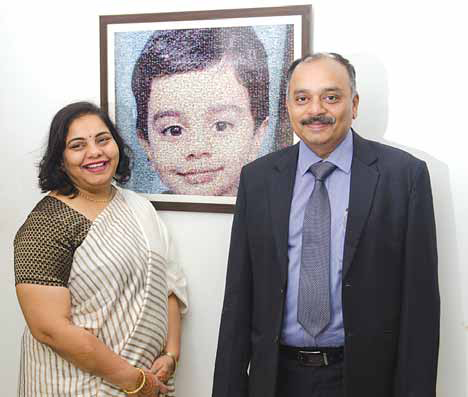
PN Vasanti who helps shape policy through media studies and marketing and development research, and Premchand Palety, best known for education institute rankings, political strategies, election surveys and polls, are an intellectual pair. Both carry out pioneering work in their own social domains. Though imbued with very different traits, they’ve found ways to maintain a happy marriage and a very fine work-life balance.
Both are known for their respective expertise and frequently feature in media debates. Vasanti is the Director General of the Centre for Media Studies (CMS), a highly respected, multidisciplinary development research and facilitative think tank. She is also the Director of Marketing & Development Research Associates (MDRA), a premier marketing research and consulting organisation with focus on quantitative and qualitative research. Premchand is a political pundit and Chief Executive of the Centre for Forecasting & Research (C fore), a well-known research organisation which specialises in election surveys, market consumer research, opinion polls and performance appraisal of educational institutions.
Vasanti is a behavioural psychologist and researcher, a specialist on media habits, policy issues in broadcasting and media consumption patterns. Her expertise includes the electronic media and its influence on women, children and development. She also writes a fortnightly column on media titled ‘Fine Print’ in Mint, the HT Media Group business daily.
Premchand is a specialist in the education sector and has a vast experience in conducting election surveys with amazing accuracy. Having pioneered school rankings in India, he has been among the first to start business school rankings in India with Out-look magazine for eight years. A prolific writer and thinker on management education, he has been a regular columnist for the Wall Street Journal and Mint and also writes for Business Today, Business World, Hindustan Times and Economic Times, to name a few.
The findings of their research-based think tanks on critical issues have regularly been covered by the media. Corporate Citizen speaks to this super duo whose passion for work, their excellence on the job and the number of lives they touch through their efforts to make systems better, make them inspiring
It is often said, ‘Behind every successful man, there is a woman.’ But in some cases, the reverse can also be true. At least, this seems to be the case with Vasanti and Premchand, both extremely intelligent professionals
My driving force was to bring about a change in society but slowly I realised that only politics will not help. The root cause is something else. The more I thought about it, the more I felt that I must do something in the education field
Though their life story doesn’t have that ‘boy meets girl and they fall in love’ kind of stuff, it is interesting how they met. “Ours was an arranged marriage. I was 27 and she was 24. I was in Gurgaon, she was in Delhi. My father and her father had a common friend. It was through them that we met each other. We saw each other and then we also liked each other. In a few months, we got married,” narrates Premchand. At that point of time, he was a civil engineer from Punjab Engineering College, Chandigarh, and had a small engineering firm. She had just joined the Centre for Media Studies (CMS) run by her dad, Dr. N Bhaskar Rao, widely regarded as a pioneer in social research in India.
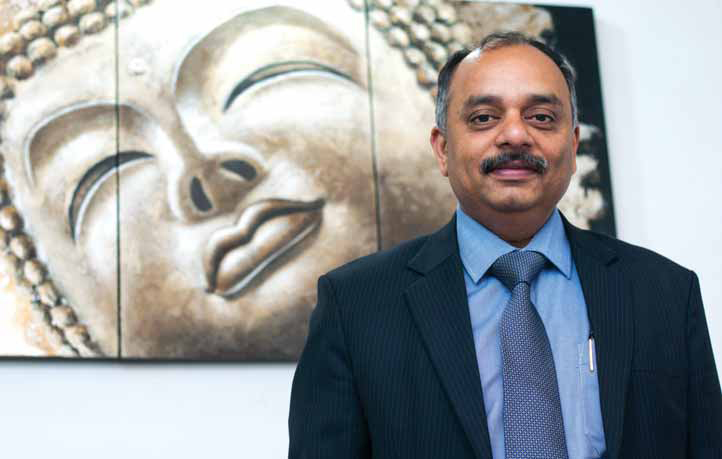
Talking about his Punjab connection, he adds, “Though we both are originally from Andhra Pradesh, I grew up in Punjab because my father worked there as an engineer on the Bhakra Dam, so my entire schooling took place in Nangal, a border town between Punjab and Himachal Pradesh. No wonder, I can read and write Gurumukhi but I can’t write Telugu. Then I did my engineering from Punjab Engineering College (PEC) in Chandigarh. So I’m more a Punjabi than a Telugu. Post-marriage, I did my MBA from the FORE school of Management in Delhi.”
Says Vasanti, “I’m a pucca Dilliwali. Though my parents are from Andhra and I was born in Vijaywada, my entire schooling and college education was done in Delhi. I went to Kamla Nehru College. I did Psychology honours and then did my master in Social Psychology from Jamia Millia University. Then I went to Delhi University’s Faculty of Management Studies (FMS) and did my MBA from there. Presently, I’m doing my PhD from JNU. So, I’ve not spared any major university in Delhi,” she concludes, joking.
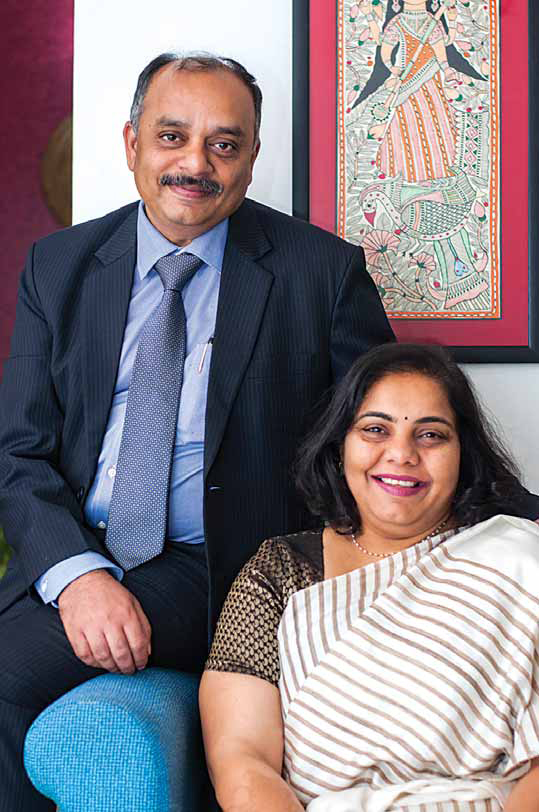
On a serious note, she adds, “I was interested in media and behaviour. How does an individual consume media? What attracts him and how does media influence his behaviour? These were my areas of concern when I started working with my father at CMS in 1989 when I had just finished school and, in 1991, when we got it registered. This year we completed 25 years. It has been an amazing journey. My father remains the founder-chairman of both CMS and MDRA.”
Chips in Premchand, “But she is the one who looks after everything in the two organisations today. Actually, her father is the doyen of opinion researchers in India. Earlier, he had built the Operations Research Group (ORG) as its CEO. He started the culture of conducting pre-poll surveys, exit polls, social surveys and the National Redressal Survey. He was the pioneer in this field.”
But did the thought of taking up a job elsewhere ever occur to her? Says Vasanti, “Never. My father was my inspiration. I always felt that if we have to bring about any change in society, it is only possible through influencing human behaviour. So while my father would talk from a sociological point of view, I would give a behavioural perspective. We used social research to influence policy and programmes since we felt that there was a disconnect between policy-makers and what was happening on the ground. Our concern was how best to use the media to connect the two and that’s why we named it Centre for Media Studies.”
Intervenes Premchand, “By the way, the thought of joining elsewhere comes when you don’t have work, or not enough revenue, or the organisation is dying - but CMS was always growing and it is growing even now".
So, where did the money come from? “We survived by doing professional work,” Vasanti says, adding, “Whatever money we make, we put it back into the organisation for further studies. CMS is unique also because it’s a not-for-profit organisation. We don’t take any grant from the government or any international think tank. We’re completely independent.” Continues she, “Our work speaks for us. Be it the India Corruption Study which was recently picked up by Delhi Chief Minister Arvind Kejriwal in a big way or the annual Vatavaran film festival on environment and wildlife, or how the media discusses issues related to children, or the media ownership debates and the study on Delhi’s traffic woes—we’ve made an impact on each such issue. In fact, for the last 15 years, we’ve been insisting that the authorities talk on road safety, urban planning and the Bus Rapid Transport (BRT) system for Delhi. Thanks to Mr Kejriwal, it’s only now that these things are getting implemented with the odd-even policy for cars and road rationing concepts,” Vasanti adds.
We used social research to influence policy and programmes since we felt that there was a disconnect between policy makers and what was happening on the ground. Our concern was how best to use the media to connect the two and that’s why we named it Centre for Media Studies
For Premchand, even though he was a civil engineer, getting an engineering job was not that easy because “1991 was a bad year for placements.” Even for small jobs, there used to be a ‘long queue’. There was recession all around. Though Prime Minister Manmohan Singh came on the scene, it was “quitelate”. Taking up a job, therefore, was the last thing he ever thought he’d get into. “I thought let me start something on my own. But our society doesn’t respect entrepreneurs and the same is true for teachers. We look down upon persons who start their own business. Yet, I went ahead and started the Centre for Forecasting & Research (C fore),” he says.
But how did this happen? What about finances? “Yes, initially, it was very difficult. I struggled. Many a time I failed also because running a business in India has never been easy. But I was always encouraged by Vasanti. She also influenced my thinking. Though our areas of interest differed, she helped me realise that my heart was in the education sector,” he points out.
“To tell you frankly, when I was doing engineering, I was a member of the Communist Party. I used to lead all the strikes at PEC. So, my driving force was to bring about a change in society but slowly I realised that only politics will not help. The root cause is something else. The more I thought about it, the more I felt that I must do something in the education field because lots of things were fundamentally wrong there. So, I decided to work in the education sector.”
How was the initial experience? “I had thought that private sector was good and I would have no difficulty. But I soon realised there was a lot of corruption and payments were never in time. Getting anything done through the government and its bureaucracy too was not easy. Go to any small office and unless you pay the babus something, they won’t do anything. It was very humiliating, so there was a lot of anger against the system in me,” he says.
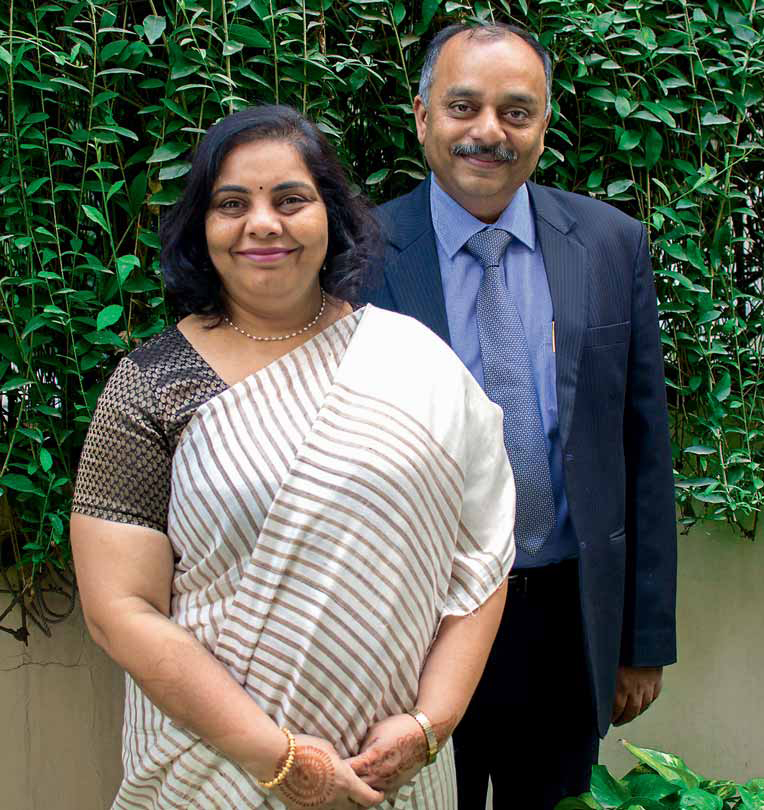
“I began with doing surveys for educational institutions. I was among the first to start the ranking of India’s best business schools. I did it with Outlook magazine for eight consecutive years. I also pioneered school rankings in India for Hindustan Times. We do it in Mumbai, Delhi-NCR and Chandigarh and then for the entire country through the Education World magazine,” he points out.
But aren’t most of these so-called rankings paid for? “I know all that but we never compromise on ethics. We evaluate them on 14 parameters of educational excellence. It’s all very objectively and transparently done. We also do a perceptual survey to confirm our findings,” he points out, and adds, smiling, “Now even Vasanti has started doing the rankings.”
“Though we’re also doing it, we just can’t match his authority and involvement in the rankings. In fact, no research house can beat him. For example, he even knows who all work in a particular organisation and what their history is. He knows all that. It’s not just his bread and butter but more than that. It’s his cheese. He loves it,” points out Vasanti.
Incidentally, in the course of doing these annual rankings, Premchand also came out with some disturbing truths. Says he, “When Mint was launched, for two years, I wrote a column in it titled ‘Business Case’ on management education where I exposed how rampant corruption in the All India Council for Technical Education (AICTE) was killing our institutions of higher learning. How could they give accreditation to third rate institutes? I wrote that they take bribe – which is something everybody knows - and because of that many sub-standard MBA colleges had mushroomed. Interestingly, even though I was writing so critically about them, the ministry people called me and said, OK, if what you say is correct, let’s revamp the system. They nominated me to the National Board for Accreditation. So, for two years, I was with the AICTE trying to revamp the accreditation methodology of higher education institutions. They were only talking of processes. So, based on whatever money you pay, they would go, evaluate and conclude that the process was fine. But they were not measuring the output at all. I said, let output also be measured. So now, they have brought in some changes. Incidentally, I was also the contributing editor for the Wall Street Journal and a columnist there for almost 16 years. In fact, I’ve penned the cover story of the latest Business World magazine and I’ve exposed this whole game of accreditation in management colleges.”
But has this really helped in any way? Replies he, “The problem in our higher education is human resources. We’re not thinking creatively and creativity is the pre-condition for the creation of new knowledge. We’re very bad at it. But the problem actually starts from play schools. That’s what I’ve been working on. I’ve designed the parameters of assessment to promote healthy competition among schools to create creative human resources. Based on my rankings, some schools and even some B-schools have changed themselves. A strong reformist movement has begun and an improvement current is flowing throughout the country.”
My driving force was to bring about a change in society, but slowly I realised that only politics will not help. The root cause is something else. The more I thought about it, the more I felt that I must do something in the education field because lots of things were fundamentally wrong there
Has anybody questioned his own objectivity? Explains he, “Any competitor can come to my office any time and see their data and our data. We have total transparency here. If I promote an institute in the overall rankings, I make sure that I have full justification in doing so.”
What is your opinion about IITs?
Instead of leading the industry, they’re just being led by the industry. A good university like Stanford in America created the Silicon Valley in their vicinity which truly changed the course of human history. All the top companies--Sun Microsystems, Yahoo, Google, Hewlett Packard, Kodak, General Electric, Lockheed-- you name it and it’s there. They all began like student projects. The faculty encouraged students to start their own companies because there were no industries nearby. The California Bay Area was just orchard and agricultural land. Students had to go to the East Coast for jobs. None of our IITs or IIMs have created any Silicon Valley in their vicinity. They have just produced jobseekers and that’s all.”
But that’s not all. “All these IITians and toppers go to IIMs only for money. Many of them are picked up by American financial giants like Goldman Sachs, Lehman Brothers, Merrill Lynch, Morgan Stanley and such others. Don’t forget these were involved in the international fraud which caused the 2008 American mortgage disaster, all because of their greed for more and more profits. They pick up brilliant minds from our IIMs and IITs and teach them how to fool and fudge figures. I shouldn’t say it but I feel sorry because these toppers could have produced some very useful, path-breaking research or created wealth or industries like the Stanford graduates did. But it’s not their fault either, because the entrepreneur culture is just not there in most of our IIMs. Many don’t have an incubation centre even now. We have 4,500 B-schools in the country and only 20 have active incubators promoting entrepreneurship. Their success rate is also pretty disappointing— less than 20 per cent or just two to three people at the most-nothing like America’s Babson College or Stanford University,” he says regretfully.
Incidentally, while Vasanti has over 100 employees at CMS, Premchand has a team of just about 20 permanent staffkers at C fore. “We have field force everywhere. We recruit for various projects. Like, for example, we’re doing a big survey now for an election-related project in Karnataka for Chief Minister Siddaramaiah. Earlier I worked for him for two years and helped him decide on sensitive issues, like whom to give tickets to and how to do the whole election planning. So, I’ve a small office in Bengaluru too.”
How does he choose a project? “Do I like it? Do I like the client? What does he expect from me? These are the main considerations for me. Then, I have a policy never to have commercial dealings with educational institutions because I rate them. So, I reject all such offers from business schools. Similarly, I’m sometimes approached by school owners who want me to do some research work for their new schools. My answer remains the same. I tell them, don’t talk business with me because I rate you. That’s a policy I’ve maintained over the years. But my main business comes from my political clients. I have projects in different states where I do regular work. But I’m not eager to get into new businesses. We’re not about money. Neither of us,” says Premchand.
We just can’t match his authority and involvement in the rankings. In fact, no research house can beat him. For example, he even knows who all work in a particular organisation and what their history is. He knows all that. It’s not just his bread and butter but more than that. It’s his cheese
IIMs always top the rankings because their selection process is so rigorous. Only the very best can get in. So, the ‘brand IIM’ is only because of their intake, not because of their research or faculty or output
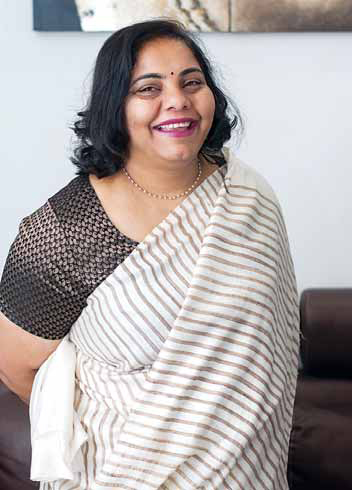
Agrees Vasanti, “Money doesn’t drive us. For me, what matters is, how can I make an impact on society and contribute positively towards changing human behaviour or lifestyles.”
Since his major business comes from political parties, what kind of work does he do for them? “We do election surveys, opinion polls and plan strategies for them. Fortunately, we have a good track record. We never compromise on ethics and never manipulate results to please any political party or TV channel. I put everything on my website. Our accuracy rate on exit polls is 95 per cent! It’s true that we charge a good amount but then we also give good results. So far so good. They are happy with our work. Our political clients and TV channels (Suvarna News and Asianet in Kerala) have come back to us again and again because we’re on the dot in the exit polls. In the 2008 Karnataka assembly elections, we predicted BJP will win and get 104-114 seats and they got 110 seats. Similarly, in 2013, we said, Congress will get 120 seats and they got 121. So, we’re on the dot. Similarly, in Kerala, we predicted UDF victory but only with one per cent, and that’s exactly what happened.”
But how could he do so well in Kerala? “Yes, we don’t have permanent staff there but the field staff is outsourced. We have tie-ups with some agencies and some B-schools. I train students to go and do the field work. It’s a learning for them and we pay them decent salaries.”
Incidentally, Premchand has a 70-slide presentation on best practices for schoolteachers. “The idea is to motivate teachers to learn these practices and thereby improve the system. I do it free of cost for all teachers. I tell them, take it home. I’ve been doing it for schools all over the country. I provide free consultancy on best practices. I’ve also been doing it for people like Nita Ambani. She’s doing a great job. She runs a very good school in Mumbai. Since I don’t take any gifts, she invites me to have lunch with her,” he reveals. On a global ranking, he says Finland has the best schools in the world. They focus on making a “good human being and not just a creative learner and also export a lot of innovative technology to the Silicon Valley every year.”
With so much going around them, how do they manage their work-life balance? Says Vasanti, “I’m very blessed because even after getting married and having a child, I’ve been able to do things the way I wanted to. I had the full support of my parents whether it was getting married without dowry or being a working woman or having a child when I wanted. And even now, when my son is in class 9, my parents are always there to back me. They live nearby and that’s a great blessing. But that doesn’t mean that we don’t have any problems. We’ve had our issues, problems of adjustment and all those things. But we’ve learnt to manage,” she sums up, smiling.
Says Premchand, “We’ve evolved. But now I don’t take very heavy projects. We’re not there for the money. I want to do selective but very effective work.”
What are their hobbies? Says Vasanti, “I love travelling. Last time, we went to China. Wherever I go, I take out time to meet the local people and know their culture. I’m very fond of TV serials.” Premchand is not. “I don’t watch TV and don’t like serials. She is a TV addict and she’s also in the Advertising Standards Council of India and being the Asia representative on the board of a fund-giving body of the Netherlands which helps NGOs worldwide; she keeps visiting Geneva and such other places. But I like reading books in my spare time. Currently I’m reading books on the neuroscience brain, neurology, but it’s all connected to education.
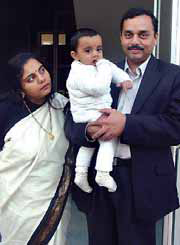
After 21 years, what is the secret of their successful marriage? Says Vasanti, “We won’t say we’re very successful but, yes, our child is someone who binds us together.” Adds Premchand, “There is no hierarchy between us. We respect each other’s space which is the core. Say, if tomorrow, she wants to go to the US for some project, I’ll never say no.”
What’s their biggest achievement? Vasanti says, “I would say, our son. He’s an absolutely delightful human being. Though very shy, he is somebody we are proud of. I’m also very proud of the work we’ve done at CMS which has played a big role in shaping a lot of major policies in our country. Though we’ve faced a lot of difficulties in the last 25 years, it has never happened that we’ve not paid salary to our employees on time.” Adds Premchand, “And, we’ve never borrowed money from anybody. I always buy cash down whatever is needed at C fore and giving salary on the first of every month is something that we’ve maintained to date.”
“I would like to think that I’m respected in higher educational institutions and schools and I’ve earned that respect because I don’t take anything from anybody. Respect keeps me going. The love and affection I get from eminent people in society is what I consider my accomplishment and that makes me humble.”
Since they both feel so proud of their son, how are they bringing him up? Says Vasanti, “Oh, we conflict quite a bit on that because we’re such different individuals. I’m very social and he’s not. I’m a big foodie but he loves ghar ka khana. So, I’m the pushy one for my son.” Intervenes Premchand, “I sometimes tell Vasanti, you’re too pushy and that’s where the conflict begins. But, thankfully, our son has a lot of empathy for others. He feeds even the street dogs and is never rude to anybody. We want him to be very happy and do whatever he wants. Though he’s too young to decide on his career, it looks like he wants to become a computer scientist. Our organisations are also there to look after, but it’s up to him to decide what he really would like to do.”
Who calls the shots at home when there is a problem? Smiles Premchand, “Oh, she’s the big boss. She handles everything.” What are their philosophies of life? “Mine is very simple. If God has sent me on earth, there is some purpose. Finding and fulfilling that is my responsibility and I’ve tried to do that to a great extent. But there is a lot to be done and a lot more lives to be touched before I leave this world and I’m very conscious of that,” says Vasanti. Agrees Premchand, “We all have to die one day but it is better to live life to the fullest before that. Happiness is very important. We have to pursue whatever area that gives us happiness,” he concludes with a twinkle in his eyes.
By Pradeep Mathur